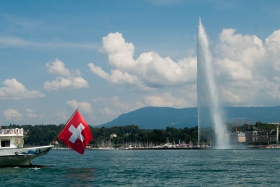Luke Hildyard writes for Shifting Grounds on why Switzerland looks a less appealing destination for the super-rich
 (this article originally appeared on the Shifting Grounds website)
(this article originally appeared on the Shifting Grounds website)
Switzerland is frequently cited as the destination of choice for super-rich individuals fearful of possible checks on their wealth and power in the UK. But the Swiss public are just as angry about excessive pay and inequality as we are.
When ruling out a mansion tax at weekend, George Osborne once again claimed that an increased contribution from the wealthiest in society risked ‘driving investment and enterprise abroad .’ It’s a familiar argument, and doubtless many people will have heard Switzerland suggested as a more understanding host for our persecuted bankers, sports stars and business leaders.
If we close tax loopholes, exert political pressure for pay restraint or even run too many newspaper articles suggesting that continuing growth in the incomes of the super-rich might be a touch inappropriate while the economy as a whole contracts and an increasing number of British families rely on charity food parcels to get a decent meal each day, we are, apparently, in danger of provoking some kind of executive exodus to the Alps.
This reached a peak in the run-up to both the introduction and the repeal of the 50p tax rate, and resurfaced when Nick Clegg suggested the idea of a time-limited wealth tax on the rich. Similar prophecies have suggested that Francois Hollande’s introduction of a 75% super tax on millionaires will also have French ‘wealth creators’ heading for the Swiss border.
These arguments rarely consider the perspective of the Swiss public. It is the generous tax regime that allows foreign residents to pay tax only on the rental value of their Swiss property which is said to compare favourably with the UK and other regimes. A small number of British citizens, including Lewis Hamilton and Phil Collins, have already taken advantage. But recent political developments suggest that their welcome is less ‘open arms’ than ‘up in arms.’
The cantons of Zurich, Schaffhausen and Appenzell have already chosen – via referendum – to scrap the preferential treatment for foreign tax exiles. A further referendum is planned in Bern. The national Parliament has opted to increase the tax rate, amidst calls from the Social Democrat opposition to abolish the tax break altogether, in favour of a more substantive wealth or income tax.
An independent MP Thomas Minder has now also forced a national referendum on pay for both foreign and Swiss business leaders working in the country. His proposals, which go further than those outlined by Vince Cable in the UK, would give shareholders a binding vote on executive pay, as well as banning parachute payments and golden handshakes. In keeping with clean, efficient Swiss stereotypes, Minder was not some dog-on-a-string anarchist prior to his political career, but a small-businessman specialising in mouthwash and cosmetics. The success of his 4 year campaign demonstrates the strength of feeling towards excessive wealth in Switzerland.
This animosity is not particularly surprising, and cannot solely be attributed to the presence in Switzerland of Phil Collins. An influx of wealthy foreigners who contribute very little to Swiss public services, but buy up the nicest houses and benefit from the country’s stable economy, law and order and first-rate infrastructure is hardly likely to strike the public as fair.
There is also an increasing body of evidence that demonstrates the damaging effects of high pay on the economy, suggesting that Minder’s success is not just based on populist rabble-rousing . In the Spirit Level, for example, Richard Wilkinson and Kate Pickett show that there is a positive relationship between patents-per-head of population and equality, suggesting that inequality reduces levels of innovation and enterprise. Raghuram Rajan, former Chief Economist at the IMF, argues that wage inflation at the top and stagnation across the rest of the population was a factor in the financial crisis, creating a market for easy credit that ultimately proved toxic. The growth of a new community of the super-rich, with resources increasingly disproportionate to the rest of the population, could cause a build-up of such problems in Switzerland
Furthermore, foreign property investors could also drive house prices up beyond the reach of ordinary Swiss families. A similar problem is already emerging in the UK – 60% of properties sold in central London are bought by overseas investors, creating a knock-on effect on prices throughout the capital and making home ownership less and less affordable for the population of London as a whole.
Whether in Switzerland or the UK, this is unsustainable. As the growing demand for action on foreign tax exiles from the Swiss public demonstrates, it is also unlikely to gain any form of popular legitimacy. The super-rich and their media champions may raise the prospect of flight whenever any challenge to their wealth in terms of fairness or long-term economic sense is issued in the UK. Sooner or later though, a gross concentration of riches among a small number of people will be challenged, regardless of the location.
Therefore, high earners must acknowledge the need for pay restraint. Threats to leave the country and the implied ‘race to the bottom’ on policies to address inequality simply are not viable. Instead we need a dialogue involving all stakeholders on how to develop recognition for successful business leaders beyond the size of their bonus, and a settlement on high pay that is compatible with a fair, sustainable and prosperous economy.